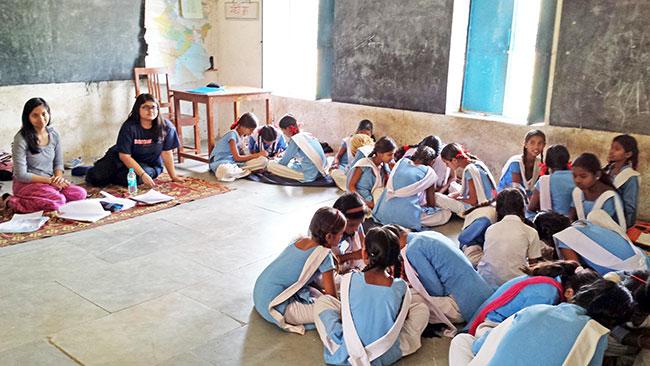Taking Learning to the Community

Ever since her freshman year, Maria Bohri has searched out ways to expand her learning beyond the classroom. As a junior in Community Health, she learned of a class called Learning in Community (LINC), an inquiry-based service-learning course that is offered by the College of Engineering. The course organizers recognized her maturity, commitment, and leadership during her interview, and she was offered a position to become a Project Manager for one of the LINC sections. In addition to facilitating LINC class sessions, Maria attended weekly workshops for project managers about service-learning principles, and how to apply them to solve community problems. Her interdisciplinary team included students from Psychology, Architecture, Advertising, Chemical Engineering, the School of Earth, Society, and the Environment, and others
The problems Maria and her team were addressing were formidable. Working in collaboration with Malaviya National Institute of Technology Jaipur and the non-governmental organizations Healthcare Sansthan and FINISH Society, they were charged with assisting the Community Partners in data collection and developing deliverables which could help the staff in their community interventions to improve the quality of life in rural districts of Rajasthan, India, where consumption of unsafe drinking water and unhealthy sanitation practices were prevalent. During a 12-day service-learning field study in India, Maria was among eight students who learned about the dangers of drinking groundwater high in fluoride and of open defecation, as well as the challenges of getting residents to adopt the healthy alternatives available to them. They conducted interviews and focus groups in communities to deepen their understanding of existing practices and resistance to change.
As a result of their work in the classroom and in the field, Maria’s LINC team developed educational materials about fluorosis, which can cause dental decay and serious changes to bone structure; Healthcare Sansthan will be able to use the materials with community members. The team also prepared a detailed cost comparison of different activated alumina regeneration methods for defluoridation. Additionally, they created case studies of health behavior change processes involved in sanitation projects and developed materials for FINISH Society to use in community interventions to enhance sanitation.
“It is incredible to say that a short semester taught me as much as it did,” Maria said. “Before this class, I didn’t think I could have a worthwhile impact on the complicated problems in the world. Seeing how service-learning concepts can be applied to issues within any context and be utilized to help make community organizations’ work more impactful, was truly eye-opening.”
Maria has long viewed herself as a global citizen with responsibility for solving problems affecting the world. Now, she says, she has skills that make her believe she can truly make a difference.